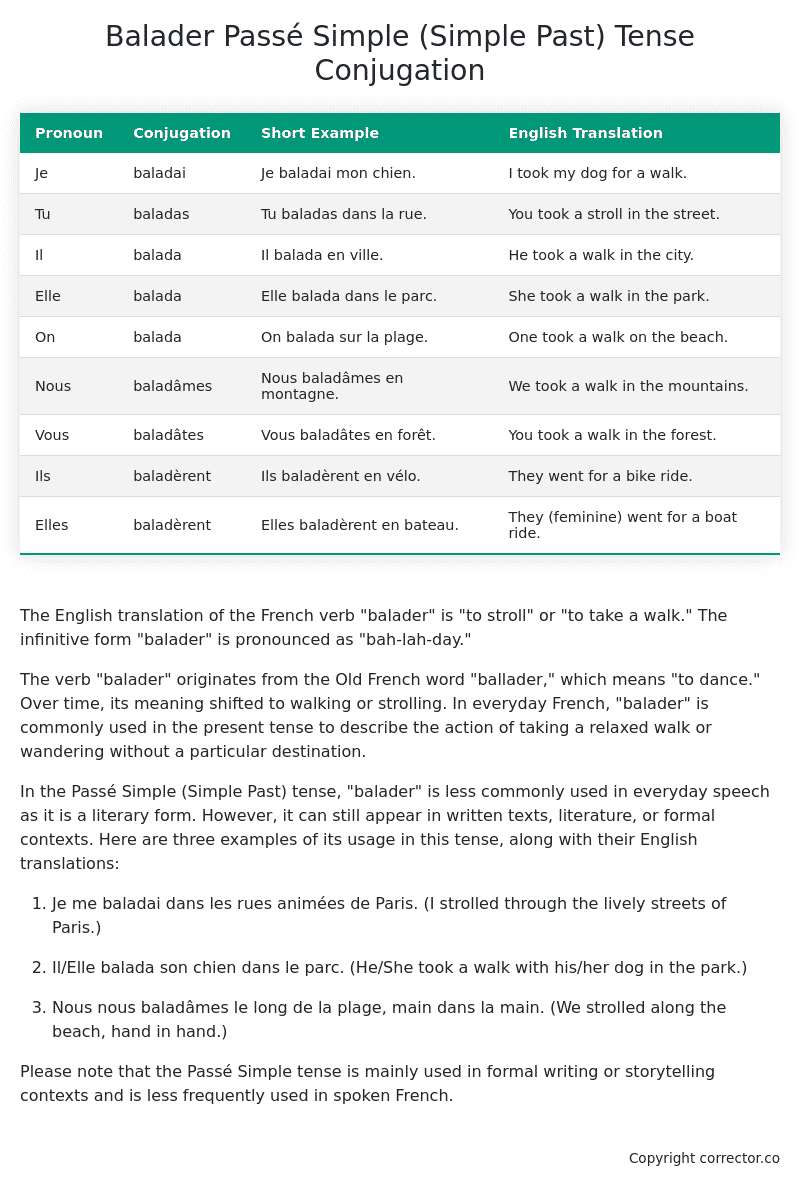Passé Simple (Simple Past) Tense Conjugation of the French Verb balader
Introduction to the verb balader
The English translation of the French verb “balader” is “to stroll” or “to take a walk.” The infinitive form “balader” is pronounced as “bah-lah-day.”
The verb “balader” originates from the Old French word “ballader,” which means “to dance.” Over time, its meaning shifted to walking or strolling. In everyday French, “balader” is commonly used in the present tense to describe the action of taking a relaxed walk or wandering without a particular destination.
In the Passé Simple (Simple Past) tense, “balader” is less commonly used in everyday speech as it is a literary form. However, it can still appear in written texts, literature, or formal contexts. Here are three examples of its usage in this tense, along with their English translations:
-
Je me baladai dans les rues animées de Paris.
(I strolled through the lively streets of Paris.) -
Il/Elle balada son chien dans le parc.
(He/She took a walk with his/her dog in the park.) -
Nous nous baladâmes le long de la plage, main dans la main.
(We strolled along the beach, hand in hand.)
Please note that the Passé Simple tense is mainly used in formal writing or storytelling contexts and is less frequently used in spoken French.
Table of the Passé Simple (Simple Past) Tense Conjugation of balader
| Pronoun | Conjugation | Short Example | English Translation |
|---|---|---|---|
| Je | baladai | Je baladai mon chien. | I took my dog for a walk. |
| Tu | baladas | Tu baladas dans la rue. | You took a stroll in the street. |
| Il | balada | Il balada en ville. | He took a walk in the city. |
| Elle | balada | Elle balada dans le parc. | She took a walk in the park. |
| On | balada | On balada sur la plage. | One took a walk on the beach. |
| Nous | baladâmes | Nous baladâmes en montagne. | We took a walk in the mountains. |
| Vous | baladâtes | Vous baladâtes en forêt. | You took a walk in the forest. |
| Ils | baladèrent | Ils baladèrent en vélo. | They went for a bike ride. |
| Elles | baladèrent | Elles baladèrent en bateau. | They (feminine) went for a boat ride. |
Other Conjugations for Balader.
Le Present (Present Tense) Conjugation of the French Verb balader
Imparfait (Imperfect) Tense Conjugation of the French Verb balader
Passé Simple (Simple Past) Tense Conjugation of the French Verb balader (You’re reading it right now!)
Passé Composé (Present Perfect) Tense Conjugation of the French Verb balader
Futur Simple (Simple Future) Tense Conjugation of the French Verb balader
Futur Proche (Near Future) Tense Conjugation of the French Verb balader
Plus-que-parfait (Pluperfect) Tense Conjugation of the French Verb balader
Passé Antérieur (Past Anterior) Tense Conjugation of the French Verb balader
Futur Antérieur (Future Anterior) Tense Conjugation of the French Verb balader
Subjonctif Présent (Subjunctive Present) Tense Conjugation of the French Verb balader
Subjonctif Passé (Subjunctive Past) Tense Conjugation of the French Verb balader
Subjonctif Imparfait (Subjunctive Imperfect) Tense Conjugation of the French Verb balader
Subjonctif Plus-que-parfait (Subjunctive Pluperfect) Tense Conjugation of the French Verb balader
Conditionnel Présent (Conditional Present) Tense Conjugation of the French Verb balader
Conditionnel Passé (Conditional Past) Tense Conjugation of the French Verb balader
Conditionnel Passé II (Conditional Past II) Tense Conjugation of the French Verb balader
L’impératif Présent (Imperative Present) Tense Conjugation of the French Verb balader
L’impératif Passé (Imperative Past) Tense Conjugation of the French Verb balader
L’infinitif Présent (Infinitive Present) Tense Conjugation of the French Verb balader
L’infinitif Passé (Infinitive Past) Tense Conjugation of the French Verb balader
Le Participe Présent (Present Participle) Tense Conjugation of the French Verb balader
Le Participe Passé (Past Participle) Tense Conjugation of the French Verb balader
Struggling with French verbs or the language in general? Why not use our free French Grammar Checker – no registration required!
Get a FREE Download Study Sheet of this Conjugation 🔥
Simply right click the image below, click “save image” and get your free reference for the balader Passé Simple tense conjugation!

Balader – About the French Passé Simple (Simple Past) Tense
Formation
Usage
Narration
Historical Context
Interactions with other tenses
Passé Composé
Imparfait
Conditional and Subjunctive
Summary
I hope you enjoyed this article on the verb balader. Still in a learning mood? Check out another TOTALLY random French verb conjugation!


